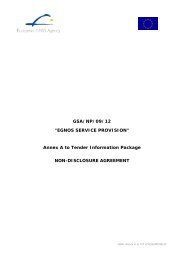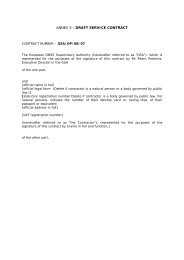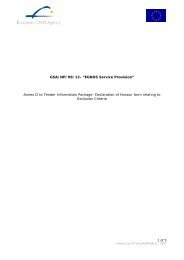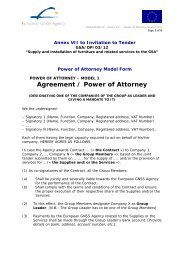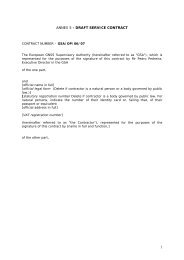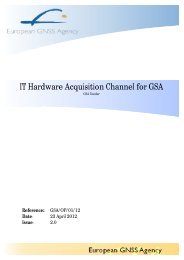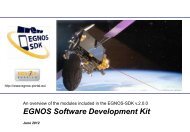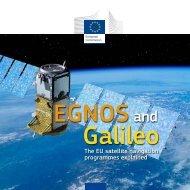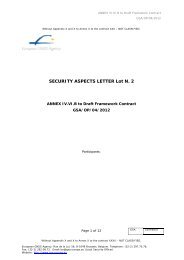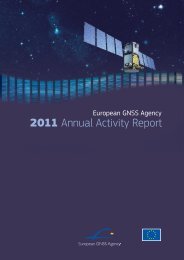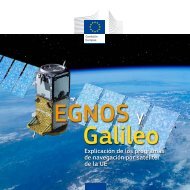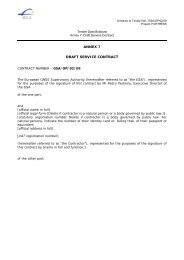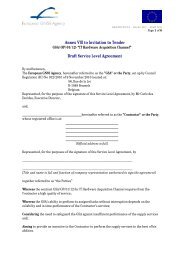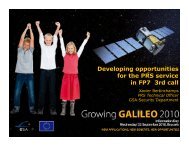Draft Work Programme 2011 - European GNSS Agency
Draft Work Programme 2011 - European GNSS Agency
Draft Work Programme 2011 - European GNSS Agency
Create successful ePaper yourself
Turn your PDF publications into a flip-book with our unique Google optimized e-Paper software.
y the GSA Administrative Board<br />
GSA AB 10-03-24-03 rev. 1<br />
<strong>European</strong> <strong>GNSS</strong> <strong>Agency</strong><br />
26th meeting ofthe Administrative Board<br />
Brussels, 18 November 2010<br />
<strong>Draft</strong> <strong>Work</strong> <strong>Programme</strong> <strong>2011</strong>
<strong>Work</strong> <strong>Programme</strong> <strong>2011</strong><br />
GSA AB 10-03-24-03 rev. 1<br />
TABLE OF CONTENTS<br />
1 INTRODUCTION................. 1<br />
2 LEGAL REFERENCE FOR THE WORK PROGRAMME <strong>2011</strong> 1<br />
3 MISSION AND TASKS OF THE <strong>GNSS</strong> AGENCY 2<br />
4 LONG-TERM VISION AND STRATEGIC OBJECTIVES.... 3<br />
5 MAIN ASSUMPTIONS OF THE WORK PROGRAMME <strong>2011</strong> 4<br />
6 PRIORITIES IN <strong>2011</strong> 5<br />
7 OUTLINE OF THE WORK PROGRAMME <strong>2011</strong>.......... 7<br />
7.1 SECURITY... 7<br />
7.1.1 Galileo security accreditation , 8<br />
7.1.2 GSMC... 9<br />
7.1.3 <strong>GNSS</strong> security requirements 11<br />
7.1.4 Piiot Project and user segment ,,,,, Ji<br />
7.1.5 <strong>European</strong> <strong>GNSS</strong> teciinology control regime 13<br />
7.1.6 <strong>GNSS</strong> Security Board and associated worl
y \hB GSA Aijministrative Board<br />
GSA AB 10-03-24-03 rev. 1<br />
<strong>Work</strong> <strong>Programme</strong> <strong>2011</strong><br />
DEFINITIONS<br />
3SC<br />
ATL<br />
CDA<br />
CDR<br />
Commission<br />
Delegation<br />
DOORS<br />
EDAS<br />
EGNOS<br />
ESA<br />
FOC<br />
FP7<br />
GKIVIF<br />
<strong>GNSS</strong><br />
<strong>GNSS</strong> <strong>Agency</strong><br />
<strong>GNSS</strong> <strong>Agency</strong><br />
Regulation or New<br />
GSA Regulation<br />
<strong>GNSS</strong> Regulation<br />
GSA<br />
GSA Regulation<br />
GSAP<br />
GSB<br />
System Safety and Security Committee<br />
Authorisation to Launch<br />
Crypto Distribution Authority<br />
Critical Design Review<br />
<strong>European</strong> Commission<br />
Delegation In accordance with Article 54(2)(b) of Council<br />
Regulation (EC, Euratom) No. 1605/2002 of 25 June 2002 on the<br />
Financial Regulation<br />
Dynamical Object-Oriented Requirements Systems<br />
EGNOS Data Access System<br />
<strong>European</strong> Geostationary Navigation Overlay Service<br />
<strong>European</strong> Space <strong>Agency</strong><br />
Full Operational Capability<br />
Seventh Framework <strong>Programme</strong> for Research and Development<br />
ofthe <strong>European</strong> Union<br />
<strong>GNSS</strong> Knowledge Management Facility<br />
Global Navigation Satellite System<br />
<strong>European</strong> <strong>GNSS</strong> <strong>Agency</strong><br />
Regulation (EU) No 912/2010 of the <strong>European</strong> Parliament and of<br />
the Council of 22 September 2010 setting up the <strong>European</strong><br />
<strong>GNSS</strong> <strong>Agency</strong>, repealing Council Regulation (EC) No 1321/2004<br />
on the establishment of structures for the management of the<br />
<strong>European</strong> sateilite radio navigation programmes and amending<br />
Regulation (EC) No 683/2008 ofthe <strong>European</strong> Parliament and of<br />
the Council<br />
Regulation (EC) No 683/2008 of the <strong>European</strong> Parliament and<br />
the Council on the further implementation of the <strong>European</strong><br />
satellite navigation programmes (EGNOS and Galileo)<br />
<strong>European</strong> <strong>GNSS</strong> Supervisor/ Authority<br />
Council Regulation (EC) No 1321/2004 on the establishment of<br />
structures for the management of the <strong>European</strong> sateliite radionavigation<br />
programmes, as amended by Council Regulation (EC)<br />
No 1942/2006<br />
Galileo Security Accreditation Panel<br />
Galiieo Security Board
GSA AB 10-03-24-03 rev. 1<br />
<strong>Work</strong> <strong>Programme</strong> <strong>2011</strong><br />
GSC<br />
GSMC<br />
lATO<br />
IOC<br />
IQV<br />
Joint Action<br />
P3RS<br />
PDR<br />
PRS<br />
SAB<br />
SAS<br />
SME<br />
SSRS<br />
WG-PRS<br />
<strong>Work</strong>ing Group<br />
WG-NET<br />
TF-TSI<br />
<strong>GNSS</strong> Security Centre<br />
Galileo Security Monitoring Centre (part of the GSC dedicated to<br />
Galileo)<br />
Interim Approval To Operate<br />
Initial Operational Capability<br />
In-Orbit Validation<br />
Council Joint Action 2004/552/CFSP of 12 July 2004 on aspects<br />
of the operation of the <strong>European</strong> satellite radio-navigation<br />
system affecting the security ofthe <strong>European</strong> Union<br />
Pilot Project for the Public Regulated Service^<br />
Preliminary Design Review<br />
Public Regulated Service<br />
Galileo Security Accreditation Board^<br />
Security Accreditation Strategy<br />
Small and Medium-sized Enterprise<br />
System specific Security Requirements Statements<br />
<strong>Work</strong>ing Group PRS (under <strong>GNSS</strong> Security Board<br />
<strong>Work</strong>ing Group under <strong>GNSS</strong> Security Board<br />
<strong>Work</strong>ing Group - National Experts Team<br />
Task Force - <strong>Programme</strong> Security Instruction<br />
^ Former name PIONEER<br />
^ Article 11 of <strong>GNSS</strong> <strong>Agency</strong> Reguiation
GSA AB 10-03-24-03 rev. 1<br />
<strong>Work</strong> <strong>Programme</strong> <strong>2011</strong><br />
1 INTRODUCTION<br />
The GSA Regulation set up the GSA, whose role has evolved over the last couple of<br />
years.<br />
The termination of the Galileo concession on 20 June 2007 and the entry into force of<br />
the <strong>GNSS</strong> Reguiation on 25 July 2008 have led to a redefinition of the GSA's tasks. The<br />
<strong>GNSS</strong> Regulation restructures the governance of the <strong>European</strong> <strong>GNSS</strong> programmes,<br />
which is based on a clear division of tasks between the Commission, the GSA and the<br />
ESA. It confers on the Commission the responsibility for the management of the<br />
<strong>European</strong> <strong>GNSS</strong> programmes and establishes that ESA shal! act as procurement agent^.<br />
As regards the GSA, the <strong>GNSS</strong> Regulation confers on the agency the tasks of security<br />
accreditation, operation of the Galileo Security Centre, contribution to the preparation<br />
ofthe commercialisation ofthe systems, including the necessary market analysis, and<br />
other tasks that may be entrusted to it by the Commission. By virtue of the <strong>GNSS</strong><br />
<strong>Agency</strong> Reguiation adopted on 22 September 2010, entering into force on 9 November<br />
2010, the GSA becomes the <strong>European</strong> <strong>GNSS</strong> <strong>Agency</strong> (<strong>GNSS</strong> <strong>Agency</strong>)<br />
2 LEGAL REFERENCE FORTHE WORK PROGRAMME <strong>2011</strong><br />
In accordance with Artide 11(6) GSA Regulation, the Administrative Board has adopted<br />
the Provisional <strong>Work</strong> <strong>Programme</strong> <strong>2011</strong> by 29^'^ March 2010. The Administrative Board<br />
will adopt the final version of the <strong>Work</strong> <strong>Programme</strong> after having received the<br />
Commission's opinion. The part of the <strong>Work</strong> <strong>Programme</strong> relating to the accreditation<br />
activities of the GSA is further subject to the approval of the SAB"^.<br />
Article 25 <strong>GNSS</strong> <strong>Agency</strong> Regulation foresees that "any measure adopted on the basis of<br />
the Regulation N° 1321/2004 shall remain valid". The adoption of the Provisional <strong>Work</strong><br />
<strong>Programme</strong> by the Administrative Board as described above therefore provides a valid<br />
iegal basis for the adoption of the final version of the <strong>Work</strong> <strong>Programme</strong>.<br />
The <strong>Work</strong> <strong>Programme</strong> <strong>2011</strong> reflects the tasks that are entrusted to the <strong>GNSS</strong> <strong>Agency</strong><br />
under the <strong>GNSS</strong> <strong>Agency</strong> Regulation^. It aiso takes into account (1) the <strong>European</strong> <strong>GNSS</strong><br />
Strategic Framework^ and <strong>Work</strong> <strong>Programme</strong> 2010^ prepared by the Commission; and<br />
^ ESA shall also act as design authority for the <strong>European</strong> <strong>GNSS</strong> programmes. See Commission Decision<br />
C(2008)8371 of 12 December 2008 adopting the 2008 <strong>Work</strong> <strong>Programme</strong> of the <strong>European</strong> satellite radionavigation<br />
programmes (EGNOS and Galileo) and Commission Decision €(2008)8378 of 12 December 2008<br />
adopting the Strategic Framework of the <strong>GNSS</strong> <strong>Programme</strong>s.<br />
"See chapter 7.1.1.1<br />
^ Regulation (EU) No 912/2010 of the <strong>European</strong> Parliament and of the Council of 22 September 2010 setting<br />
up the <strong>European</strong> <strong>GNSS</strong> <strong>Agency</strong>, repealing Council Regulation (EC) No 1321/2004 on the establishment of<br />
structures for the management of the <strong>European</strong> satellite radio navigation programmes and amending<br />
Regulation (EC) No 683/2008 of the <strong>European</strong> Parliament and of the Councii published In the Official Journal<br />
of the EU on 20 October 2010 and expected to come into force on 9 November 2010.<br />
^ 0(2009)8378,12.12.2009<br />
^C(2010)1517, 23.3.2010
GSA AB 10-03-24-03 rev. 1<br />
<strong>Work</strong> <strong>Programme</strong> <strong>2011</strong><br />
(2) the guidelines issued by the Commission in accordance with Article 16 <strong>GNSS</strong><br />
Regulation.^ The guidelines are attached to the present document as Annex 1.<br />
3 MISSION AND TASKS OF THE <strong>GNSS</strong> AGENCY<br />
The overall mission ofthe <strong>GNSS</strong> <strong>Agency</strong> is laid down in the <strong>GNSS</strong> Regulation. Article 2<br />
ofthe <strong>GNSS</strong> <strong>Agency</strong> Regulation, which defines the tasks conferred to the <strong>GNSS</strong> <strong>Agency</strong><br />
refers to Article 16 <strong>GNSS</strong> Regulation which reads:<br />
"Subject to the provisions of Article 12 [<strong>GNSS</strong> Regulation] and the respect of the<br />
Commission's role as manager of the programmes, the [<strong>GNSS</strong> <strong>Agency</strong>] shall<br />
accomplish the following tasks within the programmes in accordance with guidelines to<br />
be issued by the Commission:<br />
(a) with regard to the security of the programmes, and without prejudice to<br />
Articles 13 and 14 [<strong>GNSS</strong> Regulation], it shall ensure:<br />
(I) security accreditation; to that effect it shail Initiate and monitor the<br />
implementation of security procedures and perform system security audits;<br />
(ii) the operation of the Galileo security centre. Implemented in accordance<br />
with decisions taken pursuant to Article 13 [<strong>GNSS</strong> Regulation] and the<br />
instructions provided under Joint Action 2004/552/CFSP;<br />
(b) it shall contribute to the preparation of the commercialisation of the systems,<br />
including the necessary marl
GSA AB 10-03-24-03 rev. 1<br />
<strong>Work</strong> <strong>Programme</strong> <strong>2011</strong><br />
4 LONG-TERM VISION AND STRATEGIC OBJECTIVES<br />
The vision and strategy behind the <strong>Work</strong> <strong>Programme</strong> <strong>2011</strong> are based on the<br />
Commission's <strong>European</strong> <strong>GNSS</strong> Strategic Framework, the <strong>GNSS</strong> <strong>Agency</strong>'s experience of<br />
the programmes, and knowledge of the forward-looking positions of the Council,<br />
<strong>European</strong> Parliament and Commission.<br />
Vision<br />
• Satellite radio-navigation applications will affect and profoundly alter the<br />
mobility and security of people and goods.<br />
• The integration in the not too distant future of a reasonably accurate positioning<br />
device into every mobile telephone wil! fundamentally transform the way society<br />
deals with the dimensions of time and space.<br />
• The initiative taken by Europe to develop a new generation of global navigation<br />
satellite systems will lay the foundations for new high-tech Industry<br />
development, job creation and overall economic growth.<br />
• Galileo has every chance of becoming a universal system driven by Europe.<br />
• The <strong>GNSS</strong> <strong>Agency</strong> wi!! help the EU reap the benefits of EGNOS and Galileo by<br />
preparing and promoting the services and launching initiatives to develop new<br />
applications.<br />
• The <strong>GNSS</strong> <strong>Agency</strong> will contribute to the overal! security of the systems by<br />
accrediting the different elements thereof and managing the security monitoring<br />
centre.<br />
Strategic obiectives<br />
The <strong>Work</strong> <strong>Programme</strong> <strong>2011</strong> has been designed to reflect the activities that need to be<br />
carried out in <strong>2011</strong> towards the achievement of the foilowing main strategic<br />
objectives:®<br />
• ensure that all prerequisites for secure systems operation are in place in time to<br />
protect the Galileo assets and to guarantee the confidentiality,^^ Integrity and<br />
availability ofthe services provided;<br />
• ensure, through an accreditation process, that the risks affecting the security of<br />
the Galileo system are appropriately mitigated and the residual vulnerabilities<br />
reduced;<br />
^ The strategic objectives are mid/long-term objectives intended to ensure the full operational capability and<br />
exploitation of the <strong>European</strong> <strong>GNSS</strong>.<br />
^° "Confidentiality" In the present context means the need to protect against unwarranted disclosure of<br />
information associated with the service.
y ths QSA Administrative Board<br />
GSA AB 10-03-24-03 rev. 1<br />
<strong>Work</strong> <strong>Programme</strong> <strong>2011</strong><br />
ensure that all prerequisites for efficient operation and extensive utilisation of<br />
the systems are in place in time for the exploitation phase;<br />
ensure a thorough knowledge and understanding of the <strong>GNSS</strong> market to<br />
stimulate successful market uptake, especially of the applications with high<br />
potential for economic, social and public benefit; and<br />
promote the services of the <strong>European</strong> <strong>GNSS</strong> systems, with the focus on EGNOS<br />
as the forerunner of Galileo.<br />
5 MAIN ASSUMPTIONS OF THE WORK PROGRAMME <strong>2011</strong><br />
The <strong>Work</strong> <strong>Programme</strong> <strong>2011</strong> has been drafted on the basis of the following main<br />
assumptions^^:<br />
Galileo:<br />
" lOV will continue until end 2012.<br />
• The remaining major procurement contracts for WP2 (GMS), WP3 (GCS) are<br />
expected to be concluded in <strong>2011</strong>.<br />
• An Initial Operations Capability (IOC) with initial impiementation of the Open<br />
Service, PRS and SAR will be achieved in 2014 within the existing budget<br />
provisions. The achievement of FOC will depend on the remaining major<br />
procurement contracts, especially WP2 (GMS), and the availability of additional<br />
funding.<br />
• A mid-term review of the <strong>GNSS</strong>-<strong>Programme</strong>s, including proposals for the<br />
operational phase of Galileo will be presented in 2010.<br />
• The accreditation work necessary for the Galileo lOV system security design will<br />
be completed in time for achieving the Authorisation To Launch (ATL) milestone<br />
for the first two XOV satellites in the first half of <strong>2011</strong>. Furthermore, the<br />
accreditation work necessary for the lOV Start Endorsement in the second half<br />
of <strong>2011</strong> and System Initial Approval To Operate (lATO) in mid 2012 will be<br />
completed in time for the lOV Start Endorsement and System Initial Approval<br />
To Operate milestones respectively.<br />
• The contract negotiations for the hosting of the GSMC will be finalised by end<br />
2010, in order to ensure availability of the centre In time for initial system preoperations<br />
in 2012.<br />
• The field trials of the PRS Pilot will start in <strong>2011</strong>.<br />
" These assumptions reflect the current understanding of the GSA based on Inputs from the <strong>European</strong><br />
Commission.
^«. . , ^ . /.. n A GSA AB 10-03-24-03 rev. 1<br />
by the GSA AdminiStrativs Bsard<br />
<strong>Work</strong> <strong>Programme</strong> <strong>2011</strong><br />
EGNOS:<br />
FP7:<br />
There will be a need to start Galileo promotional activities in the second half of<br />
<strong>2011</strong>.<br />
• The certification process of ESSP for civil aviation to achieve a Safety of Life<br />
service declaration will be concluded in 2010 (i.e. system and service provider<br />
certification).<br />
• A way forward will be determined for the Commercial Data Distribution Service<br />
following successful beta testing which wil! be formaily concluded at the end of<br />
March 2010.<br />
<strong>Work</strong> on EGNOS promotional activities wil! continue throughout <strong>2011</strong>.<br />
• The FP7 3rd call, which was published on 20 July 2010 with a budget of €38<br />
million (covering also calls for tenders and evaluation costs) will be evaluated<br />
and projects selected at the beginning of <strong>2011</strong>.<br />
SMEs support programme:<br />
• The Commission intends to delegate to the <strong>GNSS</strong> <strong>Agency</strong> the operational<br />
aspects of a SMEs support programme to provide information on <strong>GNSS</strong> and<br />
foster adoption of the system. The <strong>GNSS</strong> <strong>Agency</strong> wil! - within the delegation -<br />
assist in setting up the scheme, supervise the operations, organise events and<br />
report to the Commission.<br />
6 PRIORITIES IN <strong>2011</strong>^^<br />
Securitv<br />
Security accreditation<br />
" Authorisation to Launch (ATLl, mid <strong>2011</strong>)<br />
• lOV Start Endorsement (second half of <strong>2011</strong>).<br />
• System Interim Approval to Operate (lATO) mid 2012.<br />
• Initialisation and support to the Crypto Design Authority and to the flight key cell.<br />
" Organisation, chair and secretary ofthe Galileo Security Accreditation Panel (GSAP).<br />
^^ The security related activities are listed In order of priority.<br />
5
GSA AB 10-03-24-03 rev. 1<br />
<strong>Work</strong> <strong>Programme</strong> <strong>2011</strong><br />
GSMC<br />
• Preparation of the hosting facilities for the GSMC.<br />
• Expertise support for the GSMC Preliminary and Critical Design Review (PDR and<br />
CDR).<br />
• Expertise support for and review of GSMC hosting sites deployment.<br />
• Recruitment and training of GSMC staff.<br />
Support to PRS service^^<br />
• Assessment of GSMC connections with User (National) infrastructure.<br />
• PRS Pilot Project implementation.<br />
• Preparation of the critical elements of the PRS user segment so that PRS can be used<br />
as soon as Gailieo is operational.<br />
• Support to the work on the PRS User Segment, by performing market researches in<br />
the field of receivers R&D and appiication areas of homeland security, emergency<br />
services, critical infrastructure and defence.<br />
• Definition of a giobai PRS User Segment Technological Roadmap.<br />
Market Development<br />
Contribution to the preparation ofthe commercialisation ofthe systems<br />
• Promotion of EGNOS.<br />
• Marketing of EGNOS in three priority segments: aviation, road and high precision<br />
(agriculture).<br />
• Implementation of the necessary service elements for EDAS and for the most<br />
promising user communities.<br />
• Support for the Commission on preparing the Galileo exploitation phase.<br />
• Preparation of the market entry of Galileo.<br />
^^ Support to the Commission within a delegation on security related tasks. The related work programme of<br />
the Commission is currently in the approval process .
y ta GSA Administrative Board ''^^^^ 10-03-24-03 rev. 1<br />
<strong>Work</strong> <strong>Programme</strong> <strong>2011</strong><br />
R&D<br />
• Management of the portfolio of projects from the 1st and 2nd FP7 calls inciuding the<br />
dissemination ofthe results.<br />
• Publication, evaluation, selection, negotiation and award of FP7 3rd call projects.<br />
7 OUTLINE OF THE WORK PROGRAMME <strong>2011</strong><br />
The following section describes the activities the <strong>GNSS</strong> <strong>Agency</strong> expects to perform In<br />
<strong>2011</strong> under the supervision of the Administrative Board and In accordance with the<br />
Commission guidelines as complemented by the working arrangement between the<br />
<strong>GNSS</strong> <strong>Agency</strong> and the Commission.<br />
The <strong>Work</strong> <strong>Programme</strong> <strong>2011</strong> is based on the resources that the <strong>GNSS</strong> <strong>Agency</strong> expects to<br />
have In <strong>2011</strong>, as presented in the draft Budget and Establishment Plan <strong>2011</strong>, which<br />
were submitted to the Administrative Board together with the <strong>Work</strong> <strong>Programme</strong> <strong>2011</strong>.<br />
If the expected resources fail to materialise and/or the specific guidelines issued by the<br />
Commission entail significant additional effort, the scope and priorities of the <strong>Work</strong><br />
<strong>Programme</strong> <strong>2011</strong> will have to be adjusted accordingly. Concerning the security area,<br />
the security priorities n° 1 (security accreditation) and n° 2 (GSMC) shall be achieved in<br />
the first place.<br />
7.1 Security ^<br />
In <strong>2011</strong>, the main systems security activities for the <strong>GNSS</strong> <strong>Agency</strong> will be related to: 1)<br />
security accreditation; ii) preparation of the GSMC. The activity on accreditation<br />
Includes the management of the GSAP, of the CDA as well as the secretariat of the<br />
SAB.<br />
In addition, the following activities will be pursued in support of the Commission,<br />
subject to a working arrangement with the Commission: iil) <strong>GNSS</strong> security<br />
requirements; iv) PRS Piiot Project; v) PRS user segment; vi) <strong>European</strong> <strong>GNSS</strong><br />
technology contro! regime and vii) <strong>GNSS</strong> Security Board and associated working<br />
groups.<br />
Such working arrangement shall outline the cooperation between the Commission and<br />
the <strong>GNSS</strong> <strong>Agency</strong> to increase the efficiency of both the <strong>GNSS</strong> <strong>Agency</strong> and the<br />
Commission in particular as concerns its responsibility as programme manager, to<br />
avoid overlapping of activities between the <strong>GNSS</strong> <strong>Agency</strong> and the Commission and to<br />
prepare future Delegations of the Commission to the <strong>GNSS</strong> <strong>Agency</strong>. The approval of the<br />
working arrangement by the <strong>GNSS</strong> <strong>Agency</strong>'s Administrative Board and its conclusion<br />
are expected in 2010.
GSA AB 10-03-24-03 rev. 1<br />
<strong>Work</strong> <strong>Programme</strong> <strong>2011</strong><br />
7.1.1 Galileo security accreditation<br />
A Security Accreditation Board for <strong>European</strong> <strong>GNSS</strong> systems ("Security Accreditation<br />
Board" or "SAB") shall be estabiished within the <strong>GNSS</strong> <strong>Agency</strong>. In relation to the<br />
<strong>European</strong> <strong>GNSS</strong> systems, the Security Accreditation Board shall have the tasks of the<br />
security accreditation authority. The SAB shall perform the tasks entrusted to the <strong>GNSS</strong><br />
<strong>Agency</strong> with regard to security accreditation under Article 16(a)(1) of the <strong>GNSS</strong><br />
Regulation and take "security accreditation decisions" . Such decisions shall include:<br />
- the approval of the security accreditation strategy and of satellite launches,<br />
- the authorisation to operate the systems in their different configurations and for the<br />
various services,<br />
- the authorisation to operate the ground stations and in particular the sensor stations<br />
located In third countries,<br />
as wel! as the authorisation to manufacture receivers containing PRS technology and<br />
their components.<br />
The <strong>GNSS</strong> <strong>Agency</strong> expects the SAB to be set up in 2010^", after the entry into force of<br />
the <strong>GNSS</strong> <strong>Agency</strong> Regulation, and to be fully operational in <strong>2011</strong>. The <strong>GNSS</strong> <strong>Agency</strong><br />
wil! ensure the setting-up as well as the work of the SAB.<br />
The Security Accreditation Board shall set up special subordinate bodies, acting on its<br />
instructions, to deal with specific Issues. In particular, while ensuring necessary<br />
continuity of work, it shall set up:<br />
- a panel (GSAP) to conduct security analysis reviews and tests to produce the<br />
relevant risk reports In order to assist It in preparing its decisions;<br />
- a Crypto Distribution Authority (CDA) to assist the Security Accreditation Board in<br />
particular with regard to questions related to flight keys^^.<br />
In <strong>2011</strong>, the accreditation activities of the <strong>GNSS</strong> <strong>Agency</strong> wili focus on the support<br />
required by the SAB from the <strong>GNSS</strong> <strong>Agency</strong> staff^^, for the preparation of the above<br />
mentioned accreditation decisions and In particular on site accreditation, system<br />
accreditation and component, PRS user segment accreditation.<br />
" First informal meeting scheduled for the 28 September 2010<br />
^^ Art:icle 11(11) <strong>GNSS</strong> <strong>Agency</strong> Regulation<br />
^^ Ari:icle 11 (10) <strong>GNSS</strong> <strong>Agency</strong> Regulation<br />
8
GSA AB 10-03-24-03 rev. 1<br />
<strong>Work</strong> <strong>Programme</strong> <strong>2011</strong><br />
Main tasks in <strong>2011</strong><br />
Set up the SAB and ensure its secretariat.<br />
Provide all required support to the SAB according to the work plan<br />
(management plan) approved by the SAB.<br />
Set up, coordinate and chair the work of the GSAP.<br />
Set up, coordinate and chair the work of the CDA.<br />
Define the Flight Key Cell Operations and implement them for the lOV launches.<br />
Participate in the Galileo procurement reviews on accreditation-related matters.<br />
Provide support to the Security Accreditation Strategy (SAS)^^<br />
Review the technical documents needed for Galileo security accreditation at<br />
system, segment and element level.<br />
Assess and review the security of the system design and system deployment<br />
and associated risks and produce the respective accreditation reports.<br />
Prepare the site security strategy and conduct site security accreditation<br />
Inspections.<br />
Define and prepare Independent Testing activities regarding the security of the<br />
Galileo system.<br />
Participate in and analyse results of security audit (statements of compliance)<br />
at system, site and component level.<br />
Define the PRS receiver accreditation framework and PRS manufacturer<br />
accreditation<br />
7.1.2 GSMC<br />
The GSMC will be the hub of <strong>European</strong> <strong>GNSS</strong> security. It wil! ensure that sensitive<br />
information relating to the use of PRS Is suitably managed and protected and Is not<br />
exposed to the Galileo Operating Centre. The GSMC will also allow the <strong>GNSS</strong> <strong>Agency</strong><br />
Article 10 (e) of the <strong>GNSS</strong> <strong>Agency</strong> Regulation
ADOPTED GSA AB 10-03-24-03 rev. 1<br />
by the GSA Adi^inistraiivs Board<br />
<strong>Work</strong> <strong>Programme</strong> <strong>2011</strong><br />
continuously to monitor the security-related status and performance of the elements of<br />
EGNOS and Galileo and of the operation of the PRS.<br />
The GSMC equipment, the part of the GSC dedicated to Galiieo, will be procured as part<br />
of the Galileo FOC by ESA. However, the hosting facilities wil! be procured by ESA within<br />
the frame of the deiegation agreement between the Commission and ESA.<br />
The GSMCs mission comprises:<br />
<strong>European</strong> <strong>GNSS</strong> security and status monitoring (for FOC, Galileo only).<br />
Command and control of <strong>European</strong> <strong>GNSS</strong> in accordance with the Joint Action.<br />
Management of PRS access.<br />
Provision of PRS and <strong>GNSS</strong> security expertise and analyses on request.<br />
The <strong>GNSS</strong> <strong>Agency</strong> as operator of the GSMC will ensure that the operations of the GSMC<br />
are prepared in due time before the formal transfer. This will entail important work from<br />
future staff of the GSMC which is expected to be available in <strong>2011</strong>^^.<br />
From <strong>2011</strong> on, the <strong>GNSS</strong> <strong>Agency</strong> has to tackle the followmg tasks in preparation of the<br />
GSMC operations:<br />
lead the GSMC operations engineering to prepare the necessary operational<br />
documentation for the GSMC operations'^;<br />
- define the need of staff, the administrative equipment for the GSMC, staff<br />
requirements, qualification, training.<br />
contribute to the GSMC infrastructure development, participate in project<br />
reviews and provision of <strong>GNSS</strong> <strong>Agency</strong> specific hosting requirements induding<br />
the negotiation of the necessary seat arrangements with the Hosting Entitles<br />
(FR & UK).<br />
- support the ESA lead GSMC Qualification <strong>Programme</strong>, especially by contributing<br />
to the <strong>Programme</strong> reviews on the GSMC.<br />
18<br />
Originally 6 members of staff, who were not authorised by the Budgetary Authority.<br />
*^ The GSF PDR (Galileo Security Facility - Preliminary Design Review) identified that this activity is not<br />
covered by the GSF contractor and is also not part of the Galileo operations preparation work which takes<br />
place in WP6.<br />
10
GSA AB 10-03-24-03 rev. 1<br />
<strong>Work</strong> <strong>Programme</strong> <strong>2011</strong><br />
• Prepare the GSMC initial operations.<br />
Main tasks in <strong>2011</strong><br />
• Follow-up the preparation of the hosting facilities for the GSMC.<br />
• Follow-up the procurement of the hosting facilities for the GSMC undertaken by<br />
ESA.<br />
• Follow up GSMC technical definition and procurement undertaken by ESA.<br />
7.1.3 <strong>GNSS</strong> security requirements<br />
Technical support to the Commission for the evolution of the Galileo SSRS will have to<br />
be provided in <strong>2011</strong>. Such technical support will be subject to a working arrangement to<br />
be agreed with the Commission. This task may indude maintaining a DOORS database,<br />
providing support for the update ofthe <strong>GNSS</strong> security policies, establishing any relevant<br />
EGNOS secu rity-related requirements and updating specific security documentation.<br />
The tasks outlined in this chapter will be performed in support to the Commission.<br />
Main tasks in <strong>2011</strong><br />
Maintain the Galileo SSRS DOORS database for security accreditation purposes<br />
(if requested by the Commission).<br />
Support updating ofthe Galileo SSRS.<br />
Support updating of <strong>GNSS</strong> (Galileo and EGNOS) security policies, threats and<br />
vulnerabilities analysis and risk assessment.<br />
Support establishment of any relevant EGNOS security-related requirements.<br />
Support updating of specific system security documentation.<br />
7.1.4 Pilot Project and user segment<br />
The first PRS signal In space broadcast is expected to be available for validation and<br />
testing purposes in the first half of <strong>2011</strong>. The PRS user segment must be prepared in<br />
11
y the 6SA AaminiSirsiiv« oya.u gg^ ^g l0-03-24-03 rev. 1<br />
<strong>Work</strong> <strong>Programme</strong> <strong>2011</strong><br />
paralle! with the Galileo infrastructure deployment so that PRS can be used as soon as<br />
Galileo is operational.<br />
To that end, in 2008, the concept of the PRS Pilot Project was launched, with a view to<br />
validating PRS operational and user functions and accelerating preparatory activities in<br />
Member States. The overal! objective of the PRS Pilot Project is to perform, within a<br />
single framework, an optimised (significant scale) pre-operational vaiidation of the PRS<br />
user functions, including testing of the overall PRS security framework. The PRS Pilot<br />
Project, which is owned by the <strong>European</strong> Commission, is designed for the benefit of the<br />
Member States to stimulate and support the Implementation of the Member States'<br />
infrastructure and services.<br />
This pre-operational validation is essential as the PRS environment is more complex<br />
than that of the other services; in addition to the deployment of a service with<br />
particular technical features and performances, a security framework has to be put in<br />
place, which affects not only the infrastructure architecture but also the Member States<br />
as future users.<br />
The first implementation activities of the PRS Pilot Project has been launched in 2010<br />
through the P3RS projects and initial proposals for improving the use of the PRS service<br />
will be prepared on the basis ofthe first results. The cooperation on the PRS projects is<br />
ruled by the working arrangement. The <strong>GNSS</strong> <strong>Agency</strong> provides support on the P3RS<br />
projects I and II launched in 2010. It is Intended that it wil! receive a related<br />
De!egatlon^° for the following P3RS projects II to be launched in <strong>2011</strong> onwards.<br />
Furthermore, since a large proportion of the PRS receivers wiil be near a<br />
communication facility, the impact that a communication channel could have in terms<br />
of both contro! of PRS access and PRS navigation performance needs to be evaluated.<br />
The <strong>GNSS</strong> <strong>Agency</strong> will continue research activities in this area In <strong>2011</strong>, in support to the<br />
Commission.<br />
The <strong>GNSS</strong> <strong>Agency</strong> wil! also support work on the PRS user Segment, by performing<br />
market researches in various application areas, e.g.: low cost and unclassified PRS<br />
receivers, homeland security, emergency services, critical infrastructure and defence.<br />
This will allow the market potentiai of PRS to be evaluated and wiil be of inestimable<br />
value in identifying the most effective market entry approach.<br />
The tasks outlined in this chapter will be performed in support to the Commission.<br />
Main tasks in <strong>2011</strong><br />
Issue calls for tenders, select, negotiate and award contracts supporting the<br />
implementation of the PRS Piiot Project, in accordance with the Commission<br />
guidelines and in accordance with the working arrangement with the<br />
Commission.<br />
^° See footnote 15<br />
12
"-•^ „ ^ GSA AB 10-03-24-03 rev. 1<br />
by the QSA Administrative Boai^<br />
<strong>Work</strong> <strong>Programme</strong> <strong>2011</strong><br />
Provide expertise and support to the <strong>GNSS</strong> Security Board <strong>Work</strong>ing Group PRS<br />
(WG-PRS), especially regarding the definition of guidelines and rules for the<br />
management of PRS in EU Member States and the definition and implementation<br />
ofthe PRS implementation plan.<br />
Deveiop cost studies, concept of low cost receivers, support the development of<br />
demonstrators or PRS receivers (in particular fitting the purpose of trials<br />
foreseen in the PRS Pilot Project) and propose a standardisation strategy and<br />
process for the next 5 years.<br />
7.1.5 <strong>European</strong> <strong>GNSS</strong> technology control regime<br />
In 2009, the GSA drafted a discussion paper^' to support the Commission in defining<br />
the objectives of a <strong>European</strong> <strong>GNSS</strong> technology contro! regime. The <strong>GNSS</strong> <strong>Agency</strong><br />
expects to continue providing this support in 2010 and to start looking at various<br />
aspects of the implementation of the regime, such as the definition of tools and<br />
methods that can be used to ensure compliance.<br />
There might be a role of the <strong>GNSS</strong> <strong>Agency</strong> in developing an implementation plan for<br />
any Control Regime by consolidating current best practice and the impact of the Control<br />
Regime on current licensing practice<br />
The tasks outlined In this chapter will be performed in support to the Commission.<br />
^^ 'Towards a Galileo Control Regime: Objectives and Requirements of Control Regime for Galileo Assets and<br />
of Transfers and Exports of Sensitive <strong>GNSS</strong> Items".<br />
13
GSA AB 10-03-24-03 rev. 1<br />
<strong>Work</strong> <strong>Programme</strong> <strong>2011</strong><br />
Main tasks in <strong>2011</strong><br />
Support to the Commission in preparing and updating the Galileo Contro!<br />
Regime as follow-up of <strong>GNSS</strong> <strong>Agency</strong>'s 2010 activities on the running of the<br />
<strong>GNSS</strong> Security Board Task Force Control.<br />
Identification ofthe tools and methods that can be used to actually enforce the<br />
<strong>European</strong> <strong>GNSS</strong> technology Control Regime.<br />
Support the Commission on an Implementation plan for any Contro! Regime by<br />
consolidating current best practice and the impact of the Control regime on<br />
current licensing practice and support to the Commission for the initia!<br />
implementation of the <strong>European</strong> <strong>GNSS</strong> technology control regime.<br />
7.1.6 <strong>GNSS</strong> Security Board and associated working groups<br />
The <strong>GNSS</strong> <strong>Agency</strong> shall provide a transverse support to the Commission in the<br />
management ofthe <strong>GNSS</strong> Security Board and associated <strong>Work</strong>ing Groups, in iine with<br />
Its specific responsibilities in the security accreditation of the systems and in the<br />
operations of the Galileo Security Centre.<br />
Main tasks in <strong>2011</strong><br />
- Technical, secretarial and logistical support to the WG-PRS.<br />
- Technical support to the WG-NET and to the TF-PSI.<br />
- Chairmanship, technical, secretarial and logistical support to the TF-Control.<br />
- Establishment and management of a Documentation Management System (DMS)<br />
ensuring a coordination and update ofthe <strong>GNSS</strong> Security Board documentation, the<br />
Systems Security Accreditation documentation and of the PRS User Segment<br />
documentation.<br />
14
GSA AB 10-03-24-03 rev. 1<br />
<strong>Work</strong> <strong>Programme</strong> <strong>2011</strong><br />
7.2 Market Development<br />
It is presumed that in 2010 the Commission will present to the Council an official<br />
communication on the post-2013 operations of the <strong>GNSS</strong> systems to the Council. The<br />
<strong>GNSS</strong> <strong>Agency</strong>'s activities in the field of market development buiid on this proposal, with<br />
a focus on market entry and business development actions for different exploitation<br />
scenarios ofthe Commercial Service.<br />
The <strong>GNSS</strong> <strong>Agency</strong>'s activities will aiso contribute to, and wiil be aligned with, the<br />
Application Action Plan^^ (<strong>GNSS</strong> APAP) adopted by the Commission in June 2010^^.<br />
They wil! continue to be coordinated with the relevant activities undertaken by the<br />
<strong>European</strong> Space <strong>Agency</strong> and the <strong>European</strong> Commission and where appropriate inscribed<br />
In the joint annual <strong>GNSS</strong> Communication Strategy ofthe three organisations.<br />
7.2.1 Contribution to the preparation of the commercialisation of the<br />
systems<br />
Important benefits of the <strong>European</strong> <strong>GNSS</strong> programmes will come from the market<br />
place, as underlined by the Commission In Its communication to the <strong>European</strong><br />
Parliament and the Council.^''<br />
Following the entry into force of the <strong>GNSS</strong> Regulation, the <strong>GNSS</strong> <strong>Agency</strong> has been<br />
assigned the task of promoting the market take-up of the <strong>GNSS</strong> systems in order to<br />
reap the maximum benefit from the systems. This task, as defined by the Commission<br />
guidelines, can be grouped as three main axes of activity:<br />
» supporting the exploitation and commercialisation of:<br />
o<br />
EGNOS, which reaches ful! operational capability through the declaration<br />
of availability of the EGNOS Open Service on 1 October 2009;<br />
o Galileo, whose market entry needs to be prepared as from <strong>2011</strong>;<br />
• understanding the potential and main trends of the <strong>GNSS</strong> market, i.e. assessing<br />
the environment In which satellite navigation applications can develop, including<br />
downstream markets, assessing the various options for improving the dynamics<br />
of the market (such as a market observatory, providing information and<br />
assistance tools for potential users, promoting Industry and user fora), and<br />
making suitable recommendations to the Commission; and<br />
^^ List of actions established by the <strong>European</strong> Commission in order to foster the development of the<br />
applications of Galileo and EGNOS.<br />
^^ COM(2010)308,14.6.2010<br />
24<br />
COM(2007)534 final, 19 September 2007.<br />
15
y'the GSA Administrative Soard<br />
^ GSA AB 10-03-24-03 rev. 1<br />
<strong>Work</strong> <strong>Programme</strong> <strong>2011</strong><br />
• contributing to the deveiopment of the market with actions to encourage the<br />
take-up of <strong>European</strong> <strong>GNSS</strong> services, leveraging on FP7 application projects with<br />
a particular focus on supporting SMEs and promotional Initiatives.<br />
The Commission plans foresee several activities to support SMEs: communication and<br />
information on <strong>GNSS</strong> programmes, improving access to financing instruments and<br />
specific support SME via a voucher scheme. This scheme will require development and<br />
management of specific tools (e.g. SMEs database, info on funding instruments,<br />
tracking system for the returns, dissemination, business matching). The <strong>GNSS</strong> <strong>Agency</strong><br />
wiil take care of the operational aspects of this programme by Delegation of the<br />
Commission.<br />
7.2.2 EGNOS marketing<br />
The first axis is Intended to ensure the early adoption of EGNOS In market segments<br />
identified as having the greatest short-term or medium-term potential.<br />
In 2009, the GSA proposed to the Commission that EGNOS market entry activities<br />
should target three priority market segments selected on the basis of their respective<br />
potentiai in terms of economic benefits and maturity: aviation, which will remain the<br />
top priority, followed by road and high precision applications.<br />
In 2010 the <strong>GNSS</strong> <strong>Agency</strong> as a key contributor continues to carry out pnority actions<br />
derived from the aforementioned EGNOS market entry approach, in the context of the<br />
Commission "Application Action Plan," including: developing and presenting cost-benefit<br />
analyses, disseminating trial results, co-marketing with players in the value chain,<br />
building market awareness and supporting promotional activities.<br />
The Commission has requested <strong>GNSS</strong> <strong>Agency</strong>'s support on:<br />
• The delivery of specific activities planned in the <strong>GNSS</strong> APPAP;<br />
• The set up, maintenance and regular upgrade of a detailed monitoring system<br />
that will periodically report (every 6 months):<br />
o<br />
o<br />
on some key market figures that the <strong>GNSS</strong> APPAP is targeting^^;<br />
on the status of the execution of the 24 actions of the <strong>GNSS</strong> APPAP,<br />
their impacts and related key performance indicators.<br />
The single actions will be coordinated and detailed with the <strong>European</strong> Commission.<br />
Furthermore, with EGNOS becoming fully operational and certified for civil aviation in<br />
2010, the EGNOS marketing activities should be stepped up in <strong>2011</strong>, following first<br />
Initiatives addressed to potential early adopters of the open signai in 2009 and 2010.<br />
^^ As described in the Commission communication COM(2010)308 of 14.06.2010 to<br />
the Council and Pariiament<br />
16
GSA AB 10-03-24-03 rev. 1<br />
<strong>Work</strong> <strong>Programme</strong> <strong>2011</strong><br />
The promotion of EGNOS will require extensive contributions to the work coordinated by<br />
the Commission with Member States, user communities and all agents of the vatue<br />
chain.<br />
In <strong>2011</strong>, one of the most important pillars will be EGNOS' entry in the air navigation<br />
market. To this purpose, the <strong>GNSS</strong> <strong>Agency</strong> wil! enact the market entr/ strategy for<br />
aviation that the Commission will propose in 2010. The <strong>GNSS</strong> <strong>Agency</strong> wili keep on<br />
contributing to the promotion of adoption schemes for aviation via initiatives targeted<br />
at airlines and airports, ieveraging on FP7 2^^^^ call projects.<br />
In order to accelerate the use of EGNOS in the road segment, the promotion of the<br />
system and its services will focus on developing a convincing value proposition in<br />
different market sub-segments, identified as the most promising from "ability to<br />
compete" and "time to market" point of views (e.g. road network management, safety<br />
systems and assistance to the driver, specialised logistics, etc.). This activity will<br />
leverage on demonstrations of features, differentiators and benefits. Including through<br />
real-scale and cross-border trials when appropriate (that is to say within the scope of<br />
FP7). In <strong>2011</strong>, based on this value proposition, a set of focused actions to support the<br />
adoption of EGNOS will be specified and implemented.<br />
In <strong>2011</strong>, the promotion of EGNOS in Precision Agriculture will continue, with the goal to<br />
increase the market share, reaching 70% by 2012.<br />
In addition, other sub-segments are being defined as targets in High Precision domain<br />
(e.g., thematic mapping and surveying applications). In <strong>2011</strong>, a focused set of actions<br />
to support the adoption of EGNOS will be implemented.<br />
The beta test of the EDAS, started at the beginning of 2009, is the first proxy of a<br />
<strong>European</strong> <strong>GNSS</strong> commercial service. It provides important information regarding<br />
demand (e.g. customer profile and benefits, market potential) and suitability of the<br />
current mode of access to service data. This information wil! allow the <strong>GNSS</strong> <strong>Agency</strong> to<br />
evaluate the economic potential, design the service model and prepare the<br />
commercialisation of the service if appropriate. The experience acquired with EDAS wil!<br />
aiso be a highly valuabie asset for the definition of the Galileo Commercial Service.<br />
At the request of the Commission, the GSA has implemented an EGNOS Applications<br />
Development Porta!^^, aggregating information of special interest for Investors and<br />
developers of new applications and for potential users in general. The <strong>GNSS</strong> <strong>Agency</strong><br />
expects to continue devoting special attention to improving this portal.<br />
Finally, the <strong>GNSS</strong> <strong>Agency</strong> will help communicate the operational status of EGNOS to the<br />
market, including by developing specific instruments to raise EGNOS awareness in<br />
target segments and effectively communicate EGNOS as a value proposition.<br />
^^ On-line web interface gathering information on EGNOS.<br />
17
y the GSA AdiTiinistrative Board<br />
GSA AB 10-03-24-03 rev. 1<br />
<strong>Work</strong> <strong>Programme</strong> <strong>2011</strong><br />
Main tasks in <strong>2011</strong><br />
• Continue the actions deriving from the EGNOS market entry strategy.<br />
• Promote the utilisation of the EGNOS open signal and safety-of-life service<br />
including stepping up EGNOS marketing activities for aviation with a view to<br />
publication of EGNOS landing procedures in major <strong>European</strong> countries by the<br />
end of <strong>2011</strong>.<br />
• Specify and implement the EGNOS market adoption plan for road.<br />
• Contribution to the definition and implementation the EDAS service model and<br />
related promotion activities.<br />
• Organise EGNOS marketing communication initiatives.<br />
" Continue to improve the EGNOS Applications Development portal.<br />
• Define the market entry approach for other market segments on the basis of<br />
promising prospects for EGNOS utilisation.<br />
• Contribute to the implementation ofthe <strong>GNSS</strong> APPAP<br />
Monitor the impact of actions, track market indicators and continue the actions<br />
deriving from the EGNOS market entry strategy.<br />
7.2.3 Market monitoring<br />
The second axis is improving the knowledge of the market. The Market Monitoring and<br />
Forecasting model developed in 2009 is a key tool for this activity. It provides a<br />
structure for the market research data and allows market analyses and forecasts to be<br />
carried out that enable a better understanding of the <strong>GNSS</strong> market and of the overall<br />
public benefit created by the systems. The <strong>GNSS</strong> <strong>Agency</strong> and the Commission are<br />
closely coordinating on the market monitoring activities. Including the monitoring needs<br />
of the <strong>European</strong> Commission, and on the related communication policy. In October<br />
2010 the Commission requested the GSA to procure a <strong>GNSS</strong> Industry database,^^<br />
^^ The implementation of such a procurement is currently under investigation in a working group between the<br />
<strong>GNSS</strong> <strong>Agency</strong> and the Commission and the implementation is subject to the available resources.<br />
18
ADOPTED<br />
by the GSAAdministmfive Board<br />
GSA AB io-03-24-03 rev. i<br />
<strong>Work</strong> <strong>Programme</strong> <strong>2011</strong><br />
Main tasks in <strong>2011</strong><br />
Act as a source of <strong>GNSS</strong> market information for the Commission, following the<br />
Market Monitoring and Forecasting process impiementation in 2010.<br />
Regularly refine and improve the Market Monitoring and Forecasting process^^,<br />
in order to reflect changes in the market and in technology.<br />
7.2.4 Development of the Galiieo market<br />
Finally, the third axis of market-related activities focuses on promoting new applications<br />
of the <strong>European</strong> satellite navigation systems. This activity is key to ensuring the<br />
sustainability of the systems and to giving an edge to the <strong>European</strong> industry in the<br />
global satellite-navigation market. The development of new applications will leverage on<br />
the FP7 funds, the management of which has been delegated to the GSA by the<br />
Commission.<br />
The <strong>GNSS</strong> <strong>Agency</strong> will focus on the markets where Galileo will offer the highest value<br />
added, as identified in the Commission Action Plans. In particular, activities will focus<br />
on:<br />
• LBS, e.g. mobile mass market and socia! LBS.<br />
• Road management, e.g. innovative schemes which shape mobility demand,<br />
intelligent navigation with information from all vehicles for active traffic<br />
management,<br />
• Road ADAS^^, e.g. safety of drivers and vulnerable users (pedestrians and<br />
cyclists).<br />
• Maritime and rail, e.g. applications to improve safety and allow inter-modality.<br />
• PRS market.<br />
• Implementing the market development actions with a view to Galileo<br />
Commercial Sen/Ice as defined in 2010 in consultation with the Commission,<br />
As regards new appiications, the <strong>GNSS</strong> <strong>Agency</strong> will continue to follow closely the<br />
development of the market in general and try to pre-empt (or at least reduce) market<br />
imperfections, in line with the strategy and methodology developed in 2008 and 2009.<br />
^^ Provides reliable <strong>GNSS</strong> market information and revenues projections, covering global <strong>GNSS</strong> market, GaHleo<br />
and EGNOS contribution and indirect public benefits.<br />
^^ Advanced Driver Assistance Systems.<br />
19
GSA AB 10-03-24-03 rev. 1<br />
<strong>Work</strong> <strong>Programme</strong> <strong>2011</strong><br />
The <strong>GNSS</strong> <strong>Agency</strong> will increase the contact it has with representative market agents<br />
(e.g. focus groups).<br />
The <strong>GNSS</strong> <strong>Agency</strong> will also support the Commission In the context of the Galiieo and<br />
ITS Action Plans.<br />
Main tasks in <strong>2011</strong><br />
Leverage on FP7 projects and complementary Interaction with industry and<br />
potentiai users to promote the development of new applications.<br />
Provide Information and assistance to potential users and investors in new<br />
applications.<br />
Promote industry and user fora in priority market segments.<br />
Support the Commission in promoting the <strong>European</strong> <strong>GNSS</strong> <strong>Programme</strong>s.<br />
7.2.5 SME support programme<br />
The Commission Action Plans provide for several activities regarding SMEs:<br />
communication and information on <strong>GNSS</strong> programmes, improving access to financing<br />
instruments and specific support via a voucher scheme. This scheme wili require<br />
development and management of specific tools (e.g. SMEs database, info on funding<br />
instruments, tracking system for returns, dissemination, business matching). The<br />
Commission has delegated responsibility for the operational aspects of this programme<br />
to the <strong>GNSS</strong> <strong>Agency</strong>.<br />
The <strong>GNSS</strong> <strong>Agency</strong> is also expecting the Commission to delegate to it the management<br />
of the operational aspects of an SME support programme to disseminate information on<br />
<strong>European</strong> satellite navigation systems and promote their adoption. The task of the<br />
<strong>GNSS</strong> <strong>Agency</strong> wil! be to help set up the scheme, supervise operations and organise<br />
events and related communications.<br />
7.3 Research and Development ^ ' '-....:...••••]<br />
7.3.1 FP7<br />
As outlined in the Commission guidelines, FP7 projects on applications and security<br />
R&D will be managed by the <strong>GNSS</strong> <strong>Agency</strong> in accordance with the terms of the<br />
Delegation made under Article 54(b) of the Financial Regulation and with the working<br />
arrangements agreed with the Commission in relation to the PRS applications and to<br />
the security related R&D activities.<br />
In managing the projects, the <strong>GNSS</strong> <strong>Agency</strong>'s objectives are:<br />
20
GSA AB 10-03-24-03 rev. 1<br />
<strong>Work</strong> <strong>Programme</strong> <strong>2011</strong><br />
• to keep the projects In line with the strategic objectives;<br />
• to maximise the project results; and<br />
" to produce an effective communication action for each project.<br />
The supervision of the projects from the FP7 1^* and 2"^ calls will continue. By mid-2010<br />
a total of 51 projects (covering both satellite navigation appiications and security) shall<br />
be managed by the <strong>GNSS</strong> <strong>Agency</strong>.<br />
At the Commission's request, the GSA has prepared and launched the FP7 3'^ Cali, in<br />
the second half of 2010, leveraging on the proven methodoiogy and the experience and<br />
Initial results ofthe FP7 1^^ and 2"^ call projects.<br />
The handling of a new FP7 call (from the preparation of the publication to the signature<br />
of the grant agreements or contracts) consumes considerable resources and has to<br />
respect strict deadlines. This work has to be closely coordinated with the management<br />
of the portfolio of on-going projects from previous calls. A peak in the workload under<br />
FP7 is expected in <strong>2011</strong>.<br />
7.3.1.1 Satellite navigation applications development and promotional<br />
initiatives<br />
18 projects were launched in 2008 under the FP7 1^*^ call and 29 In 2009 under the FP7<br />
2"*^ call. Consequently, at the beginning of 2010, 47 application projects are running^^.<br />
Following the adoption of the work programme for the FP7^\ the 3'"'^ call for proposals<br />
was launched on 20 July 2010^^ guided by the principles followed in the two previous<br />
cails: FP7-funded activities will, first, support a vertical market acceleration strategy<br />
and an action plan to stimulate the most valuable or mature market segments and,<br />
second, offer opportunities for break-through innovation independent of the area of<br />
application; a considerable part of the funds available will be dedicated to innovative<br />
appiications, SME and international cooperation.<br />
k.<br />
Main tasks in <strong>2011</strong>:<br />
Manage and dose-out the FP7 1^* call and FP7 2"'' call projects.<br />
Launch and manage approximately 30 satellite navigation appiication related<br />
projects under the FP7 3"^"^ call (from preparation of the publication to the<br />
signature of grant agreements and contracts).<br />
^° More details are provided in the 2009 Annual Activity report of the GSA (adopted on 29 March 2010)<br />
^' 0(2010)4900 of 19.7.2010.<br />
^^ Calls for proposals under the 2010 and <strong>2011</strong> work programmes of the Seventh Framework <strong>Programme</strong> for<br />
Research, Technological Development and Demonstration Activities, OJ C196/11 of 20.7.2010<br />
21
y the GSA Administrative Board<br />
GSA AB 10-03-24-03 rev. 1<br />
<strong>Work</strong> <strong>Programme</strong> <strong>2011</strong><br />
7.3.1.2 Support activities in the security domain<br />
A study on the preparations for prototyping and manufacturing PRS receivers<br />
(PROGRESS^^), including the process of standardisation, safety certification and<br />
security accreditation, was launched under the FP7 1^^ call and will end in <strong>2011</strong>.<br />
For the FP7 2"^ call, the main contracts on security and PRS are: the demonstrator of<br />
anti-tampering technologies at receiver ievel (FORTRESS^''); a PRS management<br />
simulation tool to support the PRS pre-operational phase (PROPHET^^); and a study on<br />
interference and jamming detection and mitigation to support the validation of<br />
requirements at system and user segment levels (PROTECTOR^^j.<br />
The definition of the security-related projects under the FP7 3"^ call has been finalised<br />
In 2010 before the launch.<br />
The activities outlined in this chapter will be performed in accordance with the terms of<br />
the Delegation of the Commission to the <strong>GNSS</strong> <strong>Agency</strong> on FP7 and in accordance with<br />
the working arrangements agreed with the Commission as well as in accordance with<br />
other guidelines provided by the Commission in relation to the PRS applications and to<br />
the security related R&D activities.<br />
Main tasks in <strong>2011</strong><br />
Manage and dose out the FP7 1'^ Cali and 2'^^ Call contracts (PROGRESS,<br />
FORTRESS, PROPHET, PROTECTOR).<br />
Launch and manage security related projects under FP7 3'"'^ call<br />
7.3.2 GKMF<br />
The virtual library known as GKMF was opened for limited public access through the<br />
Internet in January 2009. In 2010, the two years of production will have provided<br />
sufficient experience and a review of its functionality and an upgrade of its capacity will<br />
most probably be necessary.<br />
In <strong>2011</strong> all the information on the systems and results ofthe R&D projects will continue<br />
to be uploaded, structured and made available through secured access, according to the<br />
access rights assigned to users. Other Information will be added to cover the widest<br />
^^ PROGRESS; PROgramme for Governmental Receivers Specification and Standardisation.<br />
^^ FORTRESS: FORge of Tamper-RESistant Security module.<br />
^^ PROPHET: PRS Operations Performance Handy Evaluation Tool.<br />
^ PROTECTOR: PRS Operational Tool to Evaluate and Counteract Threats Originating from Radio-sources.<br />
22
y thg GSA Administratii^e Board<br />
GSA AB 10-03-24-03 rev. 1<br />
<strong>Work</strong> <strong>Programme</strong> <strong>2011</strong><br />
possible range of relevant activities. In addition. Information from the virtual library that<br />
is publicly accessible will be made available through satellite navigation-related web<br />
portals. GKMF will also be an important tool for the dissemination of the results produced<br />
under FP7 and other research and development programmes.<br />
Main tasks in <strong>2011</strong><br />
• Upload new information on the systems and the results ofthe R&D projects.<br />
• Improve and upgrade the GKMF platform.<br />
7.3.3 Application Projects with MATIMOP - Isreali Industry Centre for R&D<br />
Following a request by the Commission ^•^ the GSA<strong>GNSS</strong> <strong>Agency</strong> wili continue the<br />
activities for the implementation of the GIUS-1 and GIUS-2 projects until further<br />
notice. Such implementation Is done according to the terms of the cooperation<br />
agreement with MATIMOP, which the GSA inherited from the GJU, The Commission will<br />
notify the GSA<strong>GNSS</strong> <strong>Agency</strong> as soon as possible on the further cooperation scheme<br />
with Israel .<br />
Main tasks in <strong>2011</strong><br />
Review the ongoing projects in GIUS-1 and GIUS-2;<br />
valorised the results ofthe related projects;<br />
update the hand-over files for the Commission,<br />
7.4 General Administration<br />
A substantial part of the <strong>GNSS</strong> <strong>Agency</strong> resources and efforts will continue to be<br />
Invested In the financial, legal and human resources tasks that underpin the core<br />
activities of security and commercialisation of the <strong>European</strong> satellite navigation<br />
services, the proper functioning of the <strong>GNSS</strong> <strong>Agency</strong> as an EU agency with legal<br />
personality and the work of the Administrative Board. Procurement and contract<br />
management for the day-to-day business of the <strong>GNSS</strong> <strong>Agency</strong> as well as for the<br />
projects wiil continue to be a very demanding challenge, with resources needing to<br />
^^ See Letter of the Commission of 17 February 2010 (TREN/G4/D/201052237) to the Israeli authorities,<br />
Letter of the Commission of 12 July 2010 to the GSA'(ENTR/F3/ST/mb D(2010)458158) and letter of the<br />
GSA to the Commission of 29 July 2010 to the Commission (GSA/2010/MKD/OED/D465677)<br />
23
GSA AB 10-03-24-03 rev. 1<br />
<strong>Work</strong> <strong>Programme</strong> <strong>2011</strong><br />
match projects requirements. A particular challenge wil! be the preparation of the<br />
operation ofthe GSMC and the related administrative support.<br />
The <strong>GNSS</strong> <strong>Agency</strong> will continue to pursue efficiency gains in <strong>2011</strong>, focusing in particular<br />
on information systems and process design. Following the roll-out of several new<br />
information systems in 2010 (e.g. HR information system, activity-based costing<br />
system, contract management solution), the focus in <strong>2011</strong> will be on the consolidation<br />
these systems and the efficiency of processes.<br />
Choftmon ol the AdmlnlstFatlva Board<br />
DoleanOilB'iolvie<br />
24
y ths QSA Administrativs Board<br />
GSA AB 10-03-24-03 rev. 1<br />
<strong>Work</strong> <strong>Programme</strong> <strong>2011</strong><br />
List of Annexes<br />
Annex 1: Commission guidelines to the GSA (C(2009) 1153 final)<br />
25
-OF THE EUROPEAMOOyMUMOT<br />
Brussels, 25.2.2005<br />
e(2009) 1153 fmal
1- »iV*-3:*'*J"lrV*"'J'*'*';*^"*'**'**''"'^'''^^'"" *-.-i,-».<br />
Aj^^t-**'***^"'^^**"-*:** •''*'*•?•''•••'••-•''*''^i'**^'''*-*"'^^*^-'?^*^^<br />
.....4.<br />
.. ^ . ^ •> , , , ^ ^ ^ ^* - ^i.''.Jt*-»'^ >;.,,...>i,.i..^.,.<br />
0-alle&. SiicUritj aecreditation<br />
Ka?K»^kci'>t:»4^i''i >'C c<br />
,ftV..V*-p**ji_»»^V,,jt-*<br />
OperattonS'Ofthe-OSMC.,..,.>,w,^..>>-....<br />
Bt?0|5^.rt••obJ"eeti%'es•.v.i.f:,.^w.,..>.v..:,^%.-.,^^<br />
F*;^^*^*^^';.^-'^^^**^-^*'^** »••>•>?<br />
tioti,phase..,„..„.--"--.v—-/•.;...•.....-*.v....^..w....^.,,.•0<br />
2^':>£^<br />
Bieourag!-ng;mrtettake-ijp,.,.,-,...,i.^...,.;.,.,,„^.y,..v,,...;,.„.> ,,..>..,.„v...-..-.,v.;..i....•..-,..... 6-<br />
O&er Tasks entmsted^to the OS.A.i.^.,..,,..„.,...,..,...,*.*.-...^-.,->.^w,.*.-^*^.^vv^^^<br />
^kl.<br />
.AppileatioiiSidovfe'lOpiUent^aiidpfSBaotion.....<br />
S^pprt .activities, sft-^the see^rity 4ornaiii .^^<br />
.,.,....-.....v,»,.t.*.r.*v,v.i«..«^.w. ...........;'7'<br />
"4iL ;i#ti5t^m^it-co9^-ifisti0ts. i;...•'•*"'•*•'**•*•,•<br />
4iMi -•C^ontacfp^iM^::^.., ->•l,»>.iT?*?tK»j":»i-A*'ftA-:»;«"-^»*v. •i».'*j>-.^i.*-<br />
%4..-.>-vv.,.„„.,.>v-,..vw..-........-..v...,,...,..^^^<br />
f4> ,Ahtraa| work'iprogmm'me ^Sfthe'Bnropean.OHSS Supervtsqry AiithBrity...,,-,v..,,.-,w,...v %<br />
^
%<br />
The <strong>GNSS</strong> Regulation ?/hich entered into force on 25 Jury 2C-0S^ created 3 legal<br />
framework for the HU =;atellite navigation programmes EGNOS and Oahleo. as well<br />
u budi^tary stability. Ths Kegulation bas also recast ihe division of competetiees<br />
betweea the various actors atvolved, including the Europsan <strong>GNSS</strong> Supervisory<br />
Aiithorit;^^<br />
Cn accordance with the <strong>GNSS</strong> Rcgnlation the <strong>European</strong> Parliament asd Council are<br />
tfie ultimate political decisiott-making bodies tot tlie programmes, in particular for<br />
the overall programnLte oojectives and definition of ser%'ices to be provided by<br />
EGNOS and Galiieo and &r the decisions on tbe subsequent phases of the'<br />
For its part, the Boropcan Comtnission is responsible for the OTcrall -matagcmcnj of<br />
Ehe progratrmics inoliidin« ibr the nmnsgement of the ihnds ailocated ro the<br />
programmes (Article 12^2) of Ihe GKSS Regulatioxi). The Commission exurciSBS<br />
msponsjbiiity for the implementation of Galileo and EONOS and coBtrols the<br />
mission and system definitions as well as the system iinplemencation, incltiding,<br />
system security, of BONOS and Galileo. This includes coordinating siakeholdsF<br />
ifquirements. the prevemron of duplication of ta.«.ks and establishing approprlste risk<br />
mana-gcment Lriechani.sms, It des-ignjites a "Progrdmme Manager with operational<br />
respensibility for the implementation ofthe Galileo and TtGNOS programmes as •well<br />
as the neeessai7 technical and management personnel who eustire all appropriate<br />
ipterfeces \vith the OSA.<br />
The <strong>GNSS</strong> Regnlation-also addresses the role ofthe Eai-opean ONSS Supervisory<br />
Authority (GSA) in the fiirther implementation of the F-uropeaa <strong>GNSS</strong> Prograntmcs,<br />
stating specificaily in its articls 16 that<br />
"...the Autiiority shall accomplish the foUomng tmks ^^tn the progmmmes in<br />
accordance with guidelims issii^ by the Commlssiom<br />
(^4 "H*^ f^irS 0 Urn security of ths progrmnmss, if shaii em^te:<br />
(i) security occredjmtion; to that effect it shail initiate md momtor the<br />
impUmehtatiOfi of security procedhre^ and pefjbrm system see^nty cmdits,<br />
(i!/ fne operation of the Goliko security centpe^ ^pl&mi^ntcd in accotdot-'cc nifn<br />
decisiom taken mirmant to Art^s 13 an^ the itmimcttomr provid(^d under Joint<br />
Action 2004/552/CPSP:<br />
Ke^ation fBC) "No 583/2008 of fhe <strong>European</strong> P^iSfflgslt mi ^^'-§m:^tm^n;Mi^'Mf^^ SH'-tfe<br />
-ftlrd^er smplcmt-nlation of tiis Bmopeast ^l^llitc Mvig^oH -prsj^BWi^s pOMB-arJ' @alteq)„ OJ L<br />
196. 24.7 200s, p. I
(c) if shaU nlto accomplish other tasks that moj' be entrusted to ft by ike<br />
Commission, In acconhnre with Arsivie j4(2}(b) of ihii Finmciai R^gui0k>n.<br />
sddtesstfig specific issues United to theprogromme.% snck m:<br />
fi}<br />
promotmg appHc&fmm mtd service M ^ smdlite rmvigmkm market;<br />
M) eTf^mng that the ^mnpmmU ^^'systsms tre te^^kd ^ ihe appp^jd^e, ^^<br />
mitharised, certificmioft hadies".<br />
Tbis docomeift establishes the Commission's gsidelines to the GSA re%red to<br />
ahove. In doing so it follows the distinction ofthe ihtee areas of work Mithned above<br />
- sectirity, commereiahsation and "other tasks", providing til-get^ and<br />
metlio do logical guidance in cachof ihcie-aceas.<br />
Tlie acmsl t^Lskj^ to be perfesroied by the GSA will he defined in detail hy Ehe wirk<br />
pro^Uinme ofthe GSA, accordingto Artick 1 \ ofilie OSA Regulation?<br />
In conformity Vvdth the prisoipleof a strict division of rcsponsibilitici and in orderto<br />
avoid dtipliciition of tasks a^ highlighted by Arixjb i2J attd 12,2 of the GHSS<br />
Bggslation, and taking Into accoimt che iflslStatiemal framework, the pres»2&f<br />
documgnt al^-o provider guidelins'f for the intcractliiH between the Commission and<br />
m^B tb-mBt-M^m^m^-MtnmM-iQ the mtect^^Oet^ralof D0-^T»<br />
As described above, the GXSS Regulation assign^ specific tasks to the OSA, referred<br />
to as core taslcs here, hut nlso leaves ihe possihility of fhrtber tasks being ronferrt^d to<br />
Ehe GSA by the Coaimissiojti. This chapter lUts the tasks aUriboted io the OSA hy the<br />
<strong>GNSS</strong> Regulation itself, notably paragraphs fa) and (b) of anicle 16. The^s tasks are<br />
ti he carried out by the OSA on the baais of im own, available rsisoijEC^*<br />
7^, Sieettrity .AecreiMtation<br />
The <strong>European</strong> <strong>GNSS</strong> Supervisory Auihority ent^ures socyrfty ^cdtpMs^m of the<br />
systems. To thi? effect, the GSA engages and sapcn-iscs the ImpJejc^mfetion of<br />
security procedurOvS and performs security audits of die Huropean <strong>GNSS</strong> systems-<br />
^.|%,<br />
GaHleo se^irfy mcrediMion<br />
(I)<br />
Tlie l^rsa! accreditation thime will be defined by the Ibrcse^n Regnlation<br />
aniendiiag Rcguiatioii 1321/1004 •which wili align the latter on Regulation<br />
68?;200S.<br />
G-fluneB Regulatian (EC) No 132J/2004 oa thi' jstabli^hmerrf of &lnic:tures m the maiiagemeei t^f Ae,<br />
Etffop^n sst^lite rasSo-i^vi^ioiiprogjamms^^, 0} L 246, p. 1
%tif-mtrs^ it^iJ-force of lb n^ S'Sitte, and •tyithout-pr^u^tce to e#ects. ofihe<br />
^reseeij Regvriation amendip; ig"R-egiilatioa-l321:<br />
accrfedMtioii<br />
aseesaty ao^editatKBi trnpfemoitittioP plan, kitis atmoal work pro^armfte.<br />
•(J)<br />
•;^.:||ecidea h^-'t^ 0;J?A. ^rhitji#ratjve Bp'srS, tfee. GSA.provides--tte<br />
a^ropriacff i-nanagemei^t^ aM technical stif^oit to emare that tbe Oahteo<br />
Seeirlty AcGred-ttation Panel. (OSAF)^i±dre5s^ the .assoeiated ismies.<br />
The GS A? is key to coordinating the ^rious partners at Bur?ipean and tmtional letch<br />
h a^^s the OSA in undertakiiig the technical and op^ational activities needed for<br />
the-vaJidatiort ofthe security features x^f Galileo in the ftame of its accreditatjois,-<br />
(6) lite OSA sMl subisit all techtiical reviews and thoir onteotnes tn tlic<br />
fotin &f aecreditatioa reports to the GS.-VP, for their analvsls and final<br />
i:L.<br />
Opei^tlofts df the &MC<br />
The Europsant QffSS Supery^ory<br />
l^Tonitoring Cetitre (GSMC).<br />
2XZ The <strong>European</strong> Centre (CrSM^}-<br />
0^<br />
The O&A shall assist the Comrnission in preparing the ppgfrations of the<br />
GSMC. It will not^ly be involved, at the reqtit^ of ttffi Cottimi^ion<br />
Programffle Manager, in aspects of
.j^<br />
The GSA shall &mm^ that the GSMG establish^ and maintains a database of<br />
^U PRS llsots and receivers duly aaihorised ami that it will nndortake ths<br />
dmtrjl?iitiQa ofthe k^ ne^^ for acees^^ ths: service fer al! of them.<br />
#): Tlie GSA shall ensure thai the GSMC k opcmted in Ihll comphaiice with the<br />
PKS access policy, -wfth tl:^ seemity mstms^orts and wiih any t^le^'STit<br />
epsei^r uf opsrstiongE^<br />
2^<br />
€^t5ts^htitlon td thsjxi^^^iRm ofthe c^mrftercMisati'ijtt ef tfei^^^s<br />
fprike. exphimtl^n phas0<br />
The GHSS Regulation requires the Commission te ^Aittitt fo the Eitcop^a<br />
Parliament atid the Councii in 2010 a propoj^al for ih.
0^^^ TAm&mmmmt^-rci rm &^<br />
This chapter omfincs th^ activittes Mmg under Arricle 16(c) of the <strong>GNSS</strong><br />
Regulaiion, i.e entmsted to the GSA on mitlativc of the Commission. Sevctai<br />
activities arc already entrusted to the GSA by Delegation Agreement C.-2007/6439 of<br />
l'2/i2/2007 from the Commission.<br />
The activstias dc-'fcrihcd helo**' rsqulm the comkishtt of DdegatioJ^i Agreement(s)<br />
tsetweeES ^ Caamnsslon asd ihe OSA. in accordance with Article 54(2)(b) ofthe<br />
l^igjsmfcKegitlatbn. covcdfig also the transfer of budget (FP7. MEDA and othcts).<br />
The activittes t& be delegated to the GSA will be dcinikd funher in tbe rssi-jeclive<br />
Delegation Agroement(3) and ars therefore on^y broadly oyllincd here, in order to<br />
provide a complete pictufe ofthe GSA's porcfttial mandate for aenon.<br />
The GSA might be charged with implementing these actiWes, includuig making<br />
project proposals to the Commissioit's Frograrmne Managei:, organising ^hc^<br />
svaluadoB of project proposals and preparing the selection of relaincd projects.<br />
Gonckidhsg the comract^ and managing Jheir technical eontractral and admmisfrarivc<br />
felloW"t!p and pro^^iding for regular reporting to the Commisj^ion of relevant project<br />
i«snlt3. The GSA<br />
Fro^ariime iMaiiager.<br />
16ns devei<br />
TTie •objective of these activities is to foster<br />
tpphGatipns in the foi^se-eh ONSS masshjdus-tiies,<br />
'^'i-th Gahleo .and EGNOS, at the-<br />
•gr-Q-wing worldwide satelhte- navigation- market<br />
mt of positioning<br />
et applications<br />
•r<br />
This wlll be-acbfeved by eiicoura^%t^^t^-aiii'de^fepnf^'^#GtMrfes"-"m|feg up<br />
m^ yser regoirements for the whole mage of Open Service, Safety of Life {e.g.<br />
^authmtieatlon,; simplified use of mtegrity Iaformation) 'and ao-mmeroi^l serviceappliijatiohs<br />
of EONOS m^ Galileo, iti line with the Commission ONSS stmtegf^<br />
#td :aetioa.plaiis for apphation deyelopraent and intensatipnai coopeBJi-oa.<br />
l%tkrw©t%.B needed on certain aspects of tho <strong>GNSS</strong> secunty policy. 'Specifically,<br />
this c93RCdr^g s^plication develapuKut In key technologies required for the PRS v^ser<br />
segment, further research and de\'elopment into security certification and spcc-ifie<br />
securit>' accreditation issues, -such as related to PRS receK'ers snd techno^<br />
Preparatory work i>ecd^ to be undcrtalcen on the Gahleo Security \fotiitming Centre,<br />
ificktding on the prepamtion and implementation t>f the FRS Access Policy and ils<br />
opetntional management, as •'•veil as \s^ush related to export ccmtrol<br />
f^-fiber research and development must also be undertaken to cnstirc coit^lmnce of<br />
the <strong>GNSS</strong> ic-rvjces with security requirements of safety critical applications in land<br />
13^Sp>rtation. manne navigation and ci^il aviaiion.
©BN-Eiut PMNciPLEs OF cjoopfis-^-TfON- Bi^T^^tls 'tM Cmmmim .Am-'m&<br />
"The sueccss of the Buropean ONS-S prQ|rammes -re^fufe a .foint eitort "of<br />
.qoucemed. Close eooper^tion^ and cpoidmatbn mi %m4 ©osmmjE<br />
^etrcggfeites ft>r effective pra^amm^:tt^K3g{3m^t.<br />
The Director in chfirge of ONSS st DC TK^tV and the B^ccuhve Direecor rvrll vm^<br />
regularly Xox an ^ehaBge of views on rhe overall strategic<br />
To ettsurc appropriate, stable and timel)' communkatioss, contacts pointJ-r will bo<br />
nominated iti the Commission services and the GSA who will be re.sponsible for the<br />
exchange of infyfrnation in iheir respective fields of activity. These contact points<br />
m\] ensure that the respective teams in the iv^v organlbations ^•ork jtJttitly tov:,'axd^<br />
the implementatioj:i of the <strong>GNSS</strong> <strong>Programme</strong>.^ whilst maintaining their Tcspcctivc<br />
are^ of competence and re-spoj^sihihty.<br />
The Commission comact jiomt for general relations whh the OSA, given his overall<br />
ci^rdia^ioii role within the Commission, iihould be kept informed and pat in copy<br />
Dj^cM •OQmmissfGB opmfeB-eo^tfeg woikpmgiMiie-ih line wM Artlcfe 6 h)<br />
(^ A Hegulation should he smf to ^r.jasebtQr j'h charge of <strong>GNSS</strong> at DG<br />
tfe^^dstAogtm..<br />
ThetWD-ar^TisatiOns should arm to achieve adpgltpn of the Oommissioii's opiniop<br />
oathe- GSA's <strong>Work</strong> <strong>Programme</strong> -in- due, i^ he^re^-ife. pres.etitatiou to the OSA'$<br />
Admmistrj3;tiy# BrsarC<br />
frfij^iat3^Qfii;iltJfe4<br />
3ct. to: th^e '^pTf^lSle -fal^ :0.f' pr#eedt3% represeutaiWS' of iJie 'OSA •wtlf<br />
l^irricipate as observers, at. the" .meetings of the Europeart <strong>GNSS</strong> Progr^atmti^s-<br />
Committee, ._m weS: as -©ther •wer^i:^. groups, ef-relevance- to 'the OSA^s activiti^^.<br />
Participation' should' he -at the appr^prialfe level, tiamsly .its .BxcctitivB. Gheotor, the.<br />
managers of the OSA '^hd the desk oMcem -sohcefned by the gge^ida -iterns ta h&<br />
dJ$cussed durittg .Ihe'ii^tiiig-of the Contmtee,<br />
li^ :#n be hivi&ed.'tG con^^K^mill ^ce^^eti* oii the doetttnertcs io^^i<br />
^^^^^s^-to the .<strong>GNSS</strong> Coiatmttee ,^hyt_s«B5em areaia of activity ofthe GSA. Gfe<br />
mfttest^f the: Director in charge of <strong>GNSS</strong> at ClIiS TREH the 4S^A. wiH prov^e<br />
^tribqtioos for Committee meetings, :e.g. hy givti^ presentatiotts or jffovidmg.



